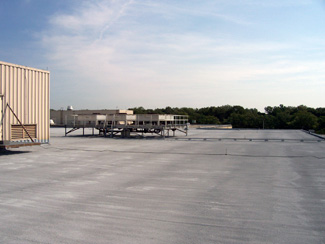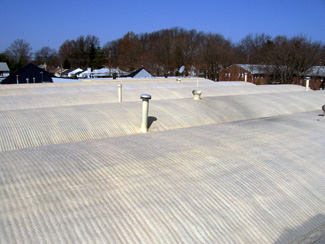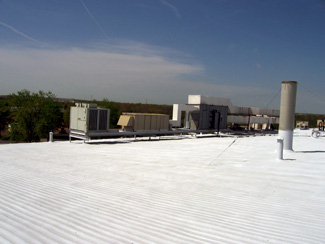- Spray Foam Systems
- Roof Restoration Systems
- Spray Foam Roofing FAQ
- Spray Foam Specialty Applications
- No-cost Roof Inspection Bid Assistance Contractor Referral

Frequently Asked Questions And Misconceptions About Sprayed Polyurethane Foam Roofing
There are common questions and misunderstandings that are frequently brought up when the subject of the sprayed polyurethane foam roofing system is discussed. Below are listed some of these questions, misconceptions and the facts about SPF roofing.

Q: Is it true that sprayed polyurethane foam roofs cannot withstand foot traffic?
A: This statement is not true. The density of sprayed polyurethane foam used on roofs is approximately 2.8lbs. This is significantly higher than the density of many of the common insulation boards used in single ply and built-up roof systems. An SPF roof will accept normal, routine foot traffic with no damage or compression to the insulation.
Q: I have heard that "birds" will eat a polyurethane foam roof!
A: The use of ceramic granules embedded in the topcoat of the sprayed polyurethane foam roofing system has virtually eliminated the incidence of bird pecks. Bird proof warranties are now available for most SPF roofing systems.
Q: Is it true that sprayed polyurethane foam roofs can only be applied when weather conditions are "perfect"?
A: FALSE! SPF roof application is generally limited only by the same conditions that limit the installation of conventional roofing systems (e.g. freezing temperatures, high winds, moisture on the roof surface, etc).
Q: Do sprayed polyurethane foam roofs blister?

A: Installed correctly, sprayed polyurethane foam roofs will not blister! Proper installation techniques and the use of robotic applicator equipment, which applies the sprayed polyurethane foam in a single pass, can eliminate the possibility of roof blisters.
Q: I have heard that sprayed polyurethane foam roofs do not last as long as conventional roof systems.
A: Recent studies have proven that not only do SPF roofs last, they generally perform better and last longer that conventional roofing systems. Additionally, SPF roofs are one of the truly "renewable" roof systems available commercially today!
Q: Do sprayed polyurethane foam roofs have fire and wind uplift approvals?
A: YES! Not only do SPF roof systems carry UL and FM fire ratings, but also they carry some of the highest wind uplift ratings of any commercially available roof systems.
Q: Do the coatings that are applied over the SPF last?
A: Silicone roof coating, which is the preferred SPF coating, is one of the longest lasting roof coatings available. It does not chalk, wash or deteriorate over extended periods of time. It has a proven track record of nearly forty years as a protective coating over SPF. Other specialty roof coatings are available for specific job-site conditions.

Q: My roofing contractor told me "I tear off sprayed polyurethane foam roofs, they do not work!"
A: Most conventional roofing contractors do not understand the application or performance of the SPF roof system. They therefore tend to undermine the performance and effectiveness of SPF roofs based on "myths" that are perpetuated in the conventional roofing industry. Even severely deteriorated SPF roofs can be rehabilitated through the "scarification and reapplication" process.
Q: Are sprayed polyurethane foam roofs bad for the environment?
A: NO! The application of a SPF roof has no effect on the environment. SPF roofs are one of the only roof systems that are "RENEWABLE" and "ENVIRONMENTALLY FRIENDLY"!
Q: What are some of the problems associated with sprayed polyurethane foam roofs?
A: Problem: In the past some "untrained" applicators installed questionable SPF roofs. Some foam contractors, while experienced in the application of SPF, did not have the specific "roofing" knowledge to apply SPF roofs.
Solution: The SPF industry has implemented significant training and accreditation programs designed to remedy these problems. Additionally the contractor qualification process by the material supplier and monitoring and verification of the SPF roof application during and after installation has all but eliminated these issues.
Problem: In past years equipment malfunctions and untested products caused some problems on SPF roofs.
Solution: Today's application equipment is state-of-the–art and materials being sold and installed today are reliable, proven and time tested to perform in the application where they are installed.
Q: What are some of the benefits of a sprayed polyurethane foam roofing system?
A: Today's sprayed polyurethane foam roofing systems feature significant benefits over most conventional roofing systems. Here are just a few:
MONOLITHIC, the SPF roofing system is monolithic, which means it provides a continuous, seamless, fully adhered, non-penetrating blanket over the entire roof surface.
LIGHWEIGHT, the installed SPF roofing system typically weighs less than ½ pound per square foot.
RETROFIT APPLICATIONS, SPF roofing systems were designed to be installed over most existing roof systems and substrates.
FAST INSTALLATION, the application of an SPF roofing system requires less application and detail times vs. a conventional roofing system, shortening the reroofing process.
HIGH INSULATION VALUE, sprayed polyurethane foam offers one of the highest aged R values (R=6.7/inch) of any commercially available insulation.
SLOPED TO DRAIN, the SPF roofing system can easily sloped during the application process to correct and improve roof drainage.
SPF ROOFS REDUCE LEAKS, The closed cell structure of sprayed polyurethane foam as well as the SPF being fully adhered to your existing roof or substrate reduces the chances of roof leaks, as moisture cannot migrate through properly installed SPF. If leaks do occur, they are generally localized below the rooftop leak source.
SPF ROOFS ARE PROVEN, properly installed and maintained, sprayed polyurethane foam roofs are a cost effective, proven, reliable roofing system!
If you have additional questions about the SPF roofing system please click below to submit your question.
